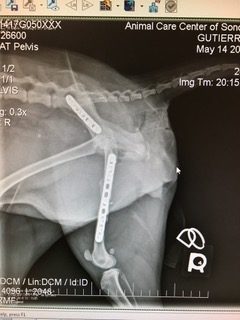Where do you do mobile surgery?
We partner with your family veterinarian to offer specific specialty surgery services to your pet and your family within your family veterinarian’s clinic. You can get some advanced surgical services in the comfort of your own family’s veterinary hospital. Procedures such as TPLO, MPL repairs, and fractures can be performed in your own family’s veterinary hospital.
Can you provide an estimate?
Please contact your family veterinarian for a specific estimate. We provide the services but each hospital charges these procedures differently. Additional diagnostics or procedures can be included and can vary the costs of each procedure, regardless of the hospital.
Why does my pet need follow up x-rays after an orthopedic surgery?
While we can evaluate stability, pain, and range of motion with a physical examination, we can not fully confirm that your pet will be safe to return to normal activity without know how well the bone is healed. The only way to confirm bone healing as we expect is with an x-ray.
Why do I need to restrict my dog’s activity after surgery?
Activity restriction following surgery is important so that your pet can heal appropriately. Too much activity can lead to post-operative complications such as increased pain, opening of an incision, implant failure, and the possible need for additional surgery.
If you have any difficulty adhering to the recommended activity restrictions due to your personal circumstances, please call your family veterinarian to discuss alternative solutions. This may include sedative medications or adjustments to activity restrictions.
Does my dog need rehabilitation?
Rehabilitation can help improve range of motion, gain muscle mass, and improve healing when performed in a controlled and guided fashion. If rehabilitation is recommended, we will provide handouts and instructions to guide you through your pet’s recovery.
Does my pet need an e-collar after surgery?
YES!!! The use of a protective E-collar at ALL times to prevent them from licking and chewing at their incision. This can lead to infection or opening of the incision, which can require additional surgery.
While there are many different types of e-collars, inflatable e-collars are NOT suitable for extremity surgeries, like TPLO, lateral suture, and MPL repair, as most pets can get around to get to their incisions.
If you are concerned that your pet is uncomfortable with the collar, please talk with your veterinarian for any alternatives or adjustments.
A limb cover or bandage is not meant to replace the use of an e-collar but protect the incision from the ground and other materials that can increase the risk of infection.
Are there specific recommendations for my pet’s incision following surgery?
The bandage applied to the incision should be removed by the following morning. If it starts to fall off prior to that, feel free to remove it before the next day.
The incision should remain closed and dry. There may be a little discomfort, swelling, redness, or bruising associated for the first 3-5 days, but that should improve with time.If you notice any increased or persistent redness, swelling, or bruising, as well as any discharge or missing staples, please contact us or your veterinarian.
You do not need to apply any ointments or wash the incision. This can introduce or trap bacteria and cause the surgery site to become infection. This could require additional surgery or longer healing times.
The e-collar is important for the 2 weeks that the incision is healing. It will be important use it particularly when you are not directly supervising your dog (when you are not in the same room or when you are sleeping).
How long is recovery from orthopedic surgery?
Different ages and surgeries or procedures can affect the recovery time. Most bones in adult dogs take at least 8 weeks to be healed enough to start a return to normal
function.
Poor bone healing, tendon healing, or other disease processes can increase healing time for some patients and may require additional diagnostics.
Dogs under 1 year of age can take about 4-6 weeks to heal.
Will my dog need joint supplements forever?
Much of the articles regarding joint supplements in dogs show no negative effects and can be helpful for management of arthritis following any joint injury. Please consult with your family veterinarian for joint supplement recommendations.

